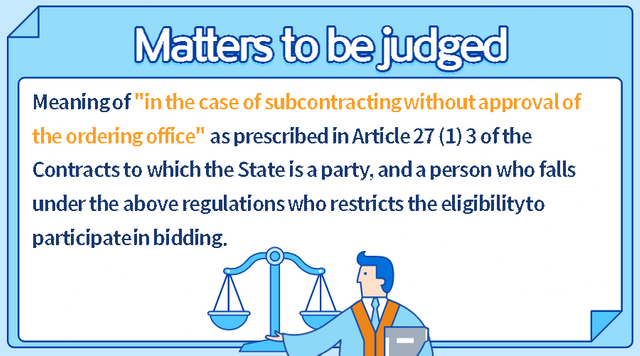If you don't check 'this' during subcontracting, you'll be in trouble! Cancellation of the restriction on eligibility to participate in bidding [Supreme Court, Dec. 29, Sentence, 2022Du57190, Judgment]

[Reference] Article 27 (1) 3 of the Act on Contracts with the State as a Party
Article 27 (Restriction on the eligibility of non-party business operators to participate in bidding) (1) The head of each central government office shall restrict the eligibility to participate in bidding within two years as prescribed by Presidential Decree, and shall immediately notify the heads of other central offices. In such cases, the head of another central government office who has received the notification shall restrict the eligibility of the relevant fraudulent business entity to participate in the bidding as prescribed by Presidential Decree.
- A person who has subcontracted or changed the conditions of subcontracting without approval from the ordering office or who has obtained approval from the ordering office in violation of the Construction Industry Framework Act, the Information and Communication Industry Act, the Software Promotion Act, and other laws.
When signing contracts for various national projects such as the state and public institutions, it is necessary to accurately check the conditions for subcontracting. According to precedents, when signing a construction contract with Korea Electric Power Corporation, the contractor of the Korea Electric Power Corporation must obtain written approval from the construction orderer in advance when he/she intends to subcontract the supplied electric work. The special conditions were specified, and the contractor overlooked them and subcontracted them without written approval, which resulted in disadvantages.
If this happens, the company will become a fraudulent business and be restricted from bidding for up to two years, which will cause serious losses not only this year, but also next year and the year after next.
In particular, it should be noted in this case that subcontracting without the approval of the contractor is not only a violation of the contract restrictions under the State contract law and other laws, but also a subcontractor and a person who subcontracted or changed the subcontract conditions approved by the contractor.
Until the third trial, it is believed that the administrative disposition was canceled by claiming that the restriction on participation in bidding violated the principle of proportionality and equality, but the claim was not accepted because the law was enforced as specified in the contract.
Therefore, the case law fully agrees with the judgment of the lower court regarding these violations of the law and contract and decided to keep the restriction on participation in the bidding.
When conducting large projects such as the state, local governments, and public institutions that take orders, it is very important to look at the regulations related to subcontracting and check legal issues in this regard. It is a precedent that says that a single mistake can cause a huge impact.